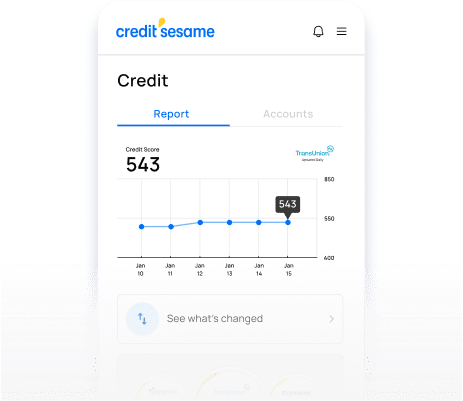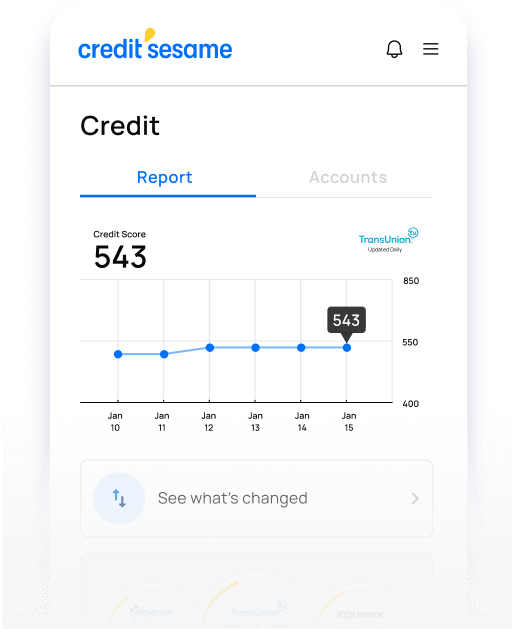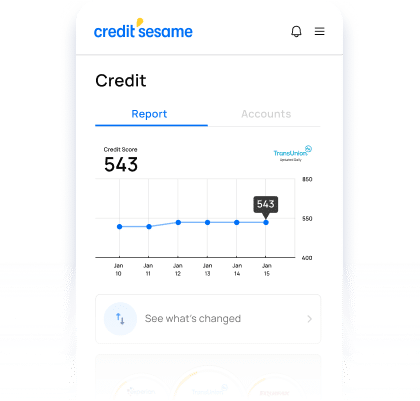How to read a credit report
Whether you are planning to apply for new credit, want to know how creditworthy you are, or wondering if you are the victim of identity theft, it’s smart to check your credit reports. You can access your three credit reports online and experts recommend checking your credit reports regularly and knowing what to look for.

Get your FREE credit report summary
See the factors impacting your credit score and what you can do about it. 100% free.
By clicking on the button above, you agree to the Credit Sesame Terms of Use and Privacy Policy.
- ON THIS PAGE
- What is in your credit report?
- Who issues credit reports?
- How to access your credit reports
- How often to review your credit reports
- What to look for in your credit reports
- Red flags to watch for
- What to do if you spot any problems or errors
- The risks of not reviewing or correcting your credit reports
- In a nutshell
Share this
What is in your credit report?
Your credit report offers a detailed record of your credit history and includes information about your borrowing and repayment habits. The report usually covers at least four categories: personal identifying information, credit accounts, credit inquiries, and public records and collections.
The personal identifying information section typically includes items like your name, address, date of birth, Social Security Number, and employment details that are used to identify you.
The credit accounts section covers any accounts you have opened across your credit history, including credit cards, loans, and lines of credit, as well as details like the date you opened each account, payment history, account balances, and your loan or credit limit.
The credit inquiry section includes a list of anyone who accessed the credit report over the last two years. This section indicates “hard” inquiries that resulted when you requested a new credit and “soft” inquiries when you got preapproved for a credit offer or when lenders requested your credit report.
The public records/collections section provides info about your public records on file with federal, state, county, or local courts, including bankruptcy actions. This section may also include details about overdue debt sent to collections.
“Credit reports are used by lenders, landlords, and other financial institutions to assess your creditworthiness and risk level. Its purpose is to provide a snapshot of your financial history and help parties like these determine if you are a good candidate for credit,” explains Dennis Shirshikov, a strategist for Awning.com and a professor of economics and finance at City University of New York.
According to the Federal Reserve, insurance companies also look to credit reports to determine if you are worthy of a policy and to set the rates you pay; employers can use your credit report, if you permit them, to determine if they want to hire you; and utility and telephone companies can glean information in your credit report to choose whether or not to offer you services.
Jeanne Kelly, credit coach and founder of The Kelly Group Coaching, says a credit report “is like the grown-up version of our school report card with finances.”
Who issues credit reports?
You have three different credit reports. These are issued by the three major credit bureaus: TransUnion, Experian and Equifax.
The credit bureaus collect the information they put in your credit report from your creditors, for example, your bank, credit card company, or mortgage lender. They also gather details from public records like court or property records. Each credit bureau organizes this information into your credit report and offers this report to companies or individuals who request it and can legally access it.
Note that the information in the report from one credit bureau may not identically match the information in the report from another credit bureau. However, all three credit reports are similar, typically.
How to access your credit reports
You are entitled to access your three credit reports for no charge at least once annually by visiting Annualcreditreport.com. Equifax, TransUnion, and Experian created this website to allow you simple and easy access to each of their credit reports. You can also phone (877) 322-8228 and request to have your three credit reports mailed to you.
Note that you must supply particular information to access your reports, such as your name, address, Social Security number, and date of birth. Also, you can request to see one, two, or all three of your reports simultaneously. But, because each credit report can differ slightly in terms of the information reported, it’s best to review and compare all three reports at the same time.
How often to review your credit reports
The pros agree that you should check your three free credit reports at least once a year, but it may make sense to review your credit reports more often.
“You should check your credit reports every 4 to 6 months,” recommends financial expert Lyle Solomon, principal attorney at Oak View Law Group. “Frequently checking your credit reports will help you stay on top of your credit information, minimizing the chances of the credit bureaus reporting inaccurate information and possibly harming your credit. You can also avoid the major consequences of identity theft, as it can go unnoticed for months or even years if you don’t regularly check your credit report.”
Shirshikov adds that it’s wise to evaluate your credit reports before planning to apply for any new credit, “as any errors or mistakes on your credit reports could affect your credit score and your ability to get approved for that new credit. If you suspect that there might be errors on your credit reports, you might want to review them more frequently.”
Kelly advises reviewing your three reports at least three months before applying for a new loan, account, or another form of credit.
What to look for in your credit reports
Once you have your credit reports available, take the time to review each carefully. It may be best to print each out so you can mark up or note any problems you spot or questions you have.
Solomon recommends thoroughly checking each of the following:
- Ensure your personal information – including your name, address, Social Security number, and phone number – is correct. Inaccurate personal information can get a credit application denied, as lenders will not be able to verify your identity.
- Review each credit account and credit history listed carefully to ensure each account number, name, balance amount, payment history, payment due date, and payment status are accurate. “Potential errors to watch for include closed accounts incorrectly reported as open as well as open accounts reported as closed, accounts in good standing reported as delinquent, payments reported as late when you paid them on time, and incorrect dates,” says Solomon.
- Scrutinize the credit inquiries section. This section lists companies that have requested a copy of your credit report. “Credit inquiries can affect your credit score, so knowing which companies can access your credit report and why is essential. If you don’t recognize one or more inquiries, it could indicate identity theft,” cautions Solomon. “Check the dates of all the listed inquiries, as they should be removed after two years.”
Red flags to watch for
Warning signs to keep an eye out for include accounts you don’t recognize, late payments, and high balances relative to your credit limits, Shirshikov points out.
“Look for any accounts that are in collections or have been charged off that you suspect are in error, too,” suggests Min Hwan Ahn, an attorney in New York.
What to do if you spot any problems or errors
If you locate any errors, inaccuracies, or other problems in any of your credit reports, you should contact the respective credit reporting agency that issued that report and dispute the error as soon as possible.
Before attempting to dispute something in a credit report, collect any documents or evidence you have that back up your dispute. For instance, if your credit report indicates incorrectly that you are late on a credit card payment, prepare to furnish receipts, copies of bills, cleared checks, or money order stubs that prove you paid on time.
Once ready, you can contact the credit reporting agency online, by phone, or by mail. Indicate the error and what you desire changed in your credit report. State the facts, explain why you are disputing this matter, and ask that the item be changed or removed. Provide copies of your supporting documentation (not the originals).
Here’s a table indicating ways to contact each credit bureau and dispute your credit report provided by the Consumer Financial Protection Bureau:
| Dispute method | Equifax | Experian | TransUnion |
|---|---|---|---|
| Online | https://www.equifax.com/personal/credit-report-services/credit-dispute/ | http://experian.com/disputes | http://transunion.com/credit-freeze/place-credit-freeze |
| Mail letter explaining mistakes and completed dispute form | Mail letter explaining mistakes | Mail letter explaining mistakes and completed dispute form | |
| https://www.consumer.equifax.ca/personal/dispute-credit-report-form/ | No dispute form needed | Dispute form: https://www.transunion.com/docs/rev/personal/InvestigationRequest.pdf | |
| http://equifax.com/cp/MailInDislcosureRequest.pdf | https://www.transunion.com/docs/rev/personal/InvestigationRequest.pdf | ||
| Mail to: Equifax Information Services LLC P.O. Box 740256 Atlanta, GA 30348 | Mail to: Experian P.O. Box 4500 Allen, TX 75013 | Mail to: TransUnion Consumer Solutions P.O. Box 2000 Chester, PA 19016 | |
| Phone | (800) 864-2978 | (888) 397-3742 | (800) 916-8800 |
If you plan to snail mail any dispute, opt for certified mail with a return receipt requested so that the post office can send a postcard indicating when your dispute letter was delivered.
“The credit reporting agency is required to investigate the erroneous information you provide within 30 days of receiving it unless they determined that the dispute is frivolous,” continues Solomon. “If the credit reporting agency determines that the disputed information is accurate, they must provide you with a written explanation of their decision. If you disagree with their results, you can send the credit reporting agency a letter with your explanation. You can also contact the Federal Trade Commission or your state’s attorney general’s office for assistance if you are unsatisfied with the results.”


The risks of not reviewing or correcting your credit reports
The consequences of not checking your credit reports or doing nothing about errors within them are significant.
“Suppose you don’t check your credit report every few months. In that case, any wrong information there could continue to hurt your credit score and your ability to get credit or loans with favorable terms and conditions – without you even knowing why,” says Solomon.
Furthermore, “you could potentially miss out on credit opportunities or end up paying higher interest rates,” Ahn adds.
Also, you could be the victim of identity that may remain undetected, harming your creditworthiness over time.
In a nutshell
Reading a credit report is essential for financial well-being. Identify patterns, check for errors, and take proactive steps to improve credit. Timely payments build a positive credit history, leading to better opportunities.
Understanding your credit report is crucial. Regularly monitor it, rectify errors, and practice responsible credit behavior. Empower yourself with financial knowledge to unlock a prosperous future.
“By taking care of your credit, you can improve your credit score and make it easier to get approved for credit when you need it,” Shirshikov suggests.

Get your FREE credit report summary
See your credit score and get insight into what’s impacting your credit
By clicking on the button above, you agree to the Credit Sesame Terms of Use and Privacy Policy.
Share this
More related articles

Get your FREE credit report summary
Understand your credit better with a free credit report summary
How to get a credit report
Value of credit reports
Reporting to credit bureaus
See your score and
credit report
summary.
See your score and credit report summary.
See the factors impacting your credit score
By clicking on the button above, you agree to the Credit Sesame Terms of Use and Privacy Policy.
















